Homicide Law: Case Analysis of Offenses, Psychosis, and Legal Defenses
VerifiedAdded on 2023/06/11
|9
|2458
|66
Report
AI Summary
This report analyzes a homicide case involving Lisa, who is accused of murdering Peter. The report begins by explaining different types of homicide, including justifiable, criminal, and state-sanctioned homicide, and delves into the concept of malice aforethought. It then addresses the legal implications if Lisa suffers from medically recognized psychosis, examining whether voluntary intoxication would affect her defense. The report references relevant case law, such as R v Mbavumbili and R v Kay, to illustrate key legal principles. The conclusion summarizes the findings, emphasizing the importance of medical evidence and legal counsel in determining the outcome of the case. The report aims to provide a clear understanding of the legal framework surrounding homicide and the factors that can influence a defendant's culpability.

Homicide Law Task
Paraphrase This Document
Need a fresh take? Get an instant paraphrase of this document with our AI Paraphraser
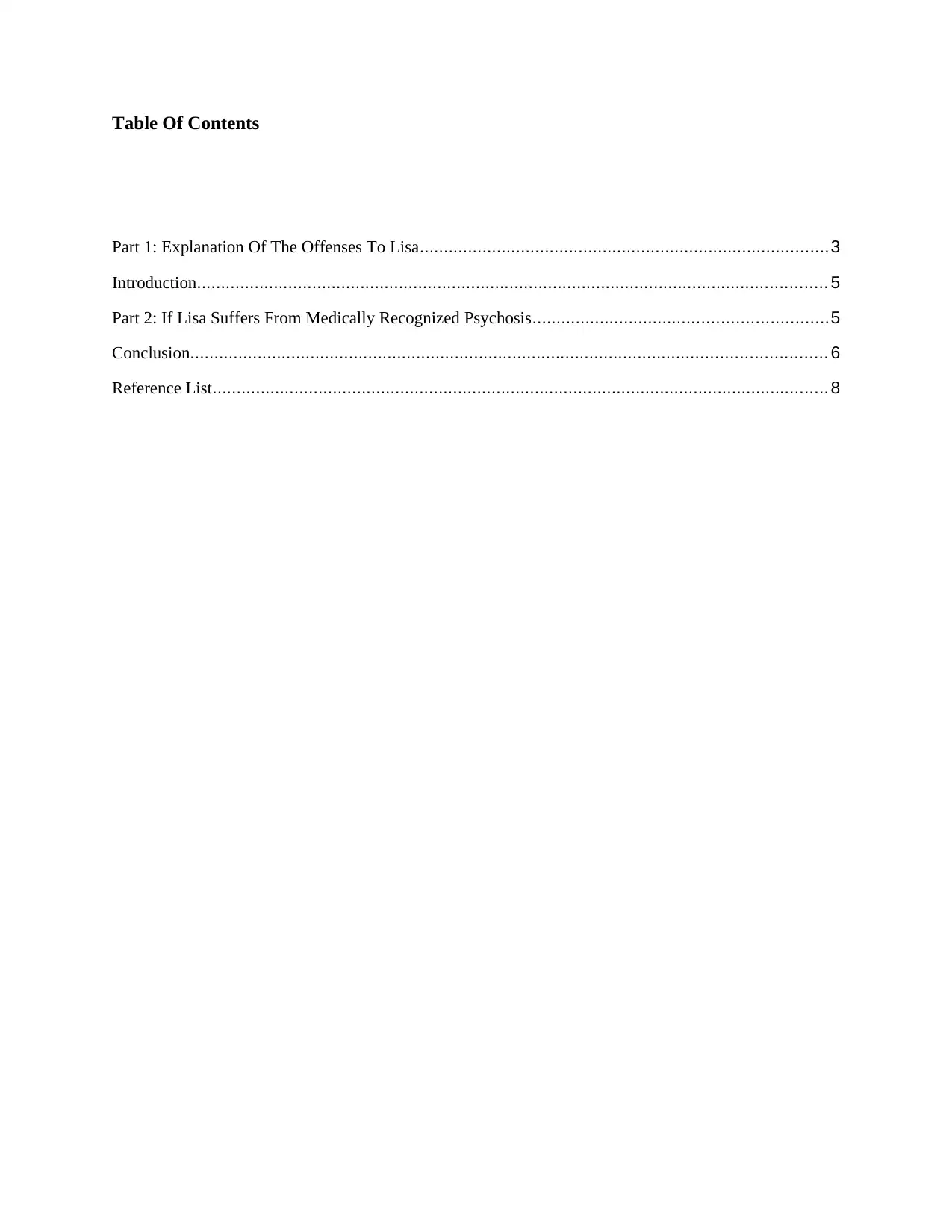
Table Of Contents
Part 1: Explanation Of The Offenses To Lisa.....................................................................................3
Introduction................................................................................................................................... 5
Part 2: If Lisa Suffers From Medically Recognized Psychosis.............................................................5
Conclusion.................................................................................................................................... 6
Reference List................................................................................................................................ 8
Part 1: Explanation Of The Offenses To Lisa.....................................................................................3
Introduction................................................................................................................................... 5
Part 2: If Lisa Suffers From Medically Recognized Psychosis.............................................................5
Conclusion.................................................................................................................................... 6
Reference List................................................................................................................................ 8
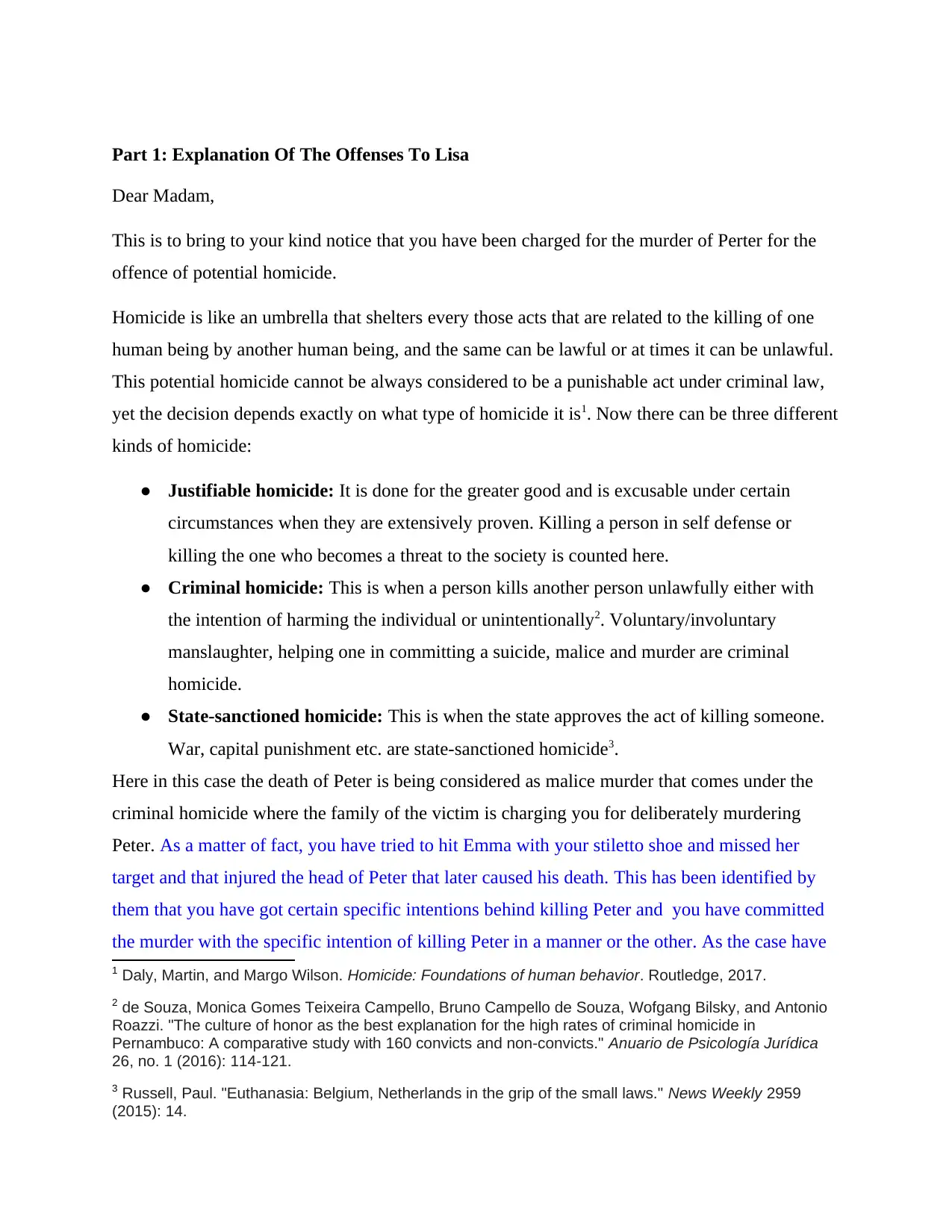
Part 1: Explanation Of The Offenses To Lisa
Dear Madam,
This is to bring to your kind notice that you have been charged for the murder of Perter for the
offence of potential homicide.
Homicide is like an umbrella that shelters every those acts that are related to the killing of one
human being by another human being, and the same can be lawful or at times it can be unlawful.
This potential homicide cannot be always considered to be a punishable act under criminal law,
yet the decision depends exactly on what type of homicide it is1. Now there can be three different
kinds of homicide:
● Justifiable homicide: It is done for the greater good and is excusable under certain
circumstances when they are extensively proven. Killing a person in self defense or
killing the one who becomes a threat to the society is counted here.
● Criminal homicide: This is when a person kills another person unlawfully either with
the intention of harming the individual or unintentionally2. Voluntary/involuntary
manslaughter, helping one in committing a suicide, malice and murder are criminal
homicide.
● State-sanctioned homicide: This is when the state approves the act of killing someone.
War, capital punishment etc. are state-sanctioned homicide3.
Here in this case the death of Peter is being considered as malice murder that comes under the
criminal homicide where the family of the victim is charging you for deliberately murdering
Peter. As a matter of fact, you have tried to hit Emma with your stiletto shoe and missed her
target and that injured the head of Peter that later caused his death. This has been identified by
them that you have got certain specific intentions behind killing Peter and you have committed
the murder with the specific intention of killing Peter in a manner or the other. As the case have
1 Daly, Martin, and Margo Wilson. Homicide: Foundations of human behavior. Routledge, 2017.
2 de Souza, Monica Gomes Teixeira Campello, Bruno Campello de Souza, Wofgang Bilsky, and Antonio
Roazzi. "The culture of honor as the best explanation for the high rates of criminal homicide in
Pernambuco: A comparative study with 160 convicts and non-convicts." Anuario de Psicología Jurídica
26, no. 1 (2016): 114-121.
3 Russell, Paul. "Euthanasia: Belgium, Netherlands in the grip of the small laws." News Weekly 2959
(2015): 14.
Dear Madam,
This is to bring to your kind notice that you have been charged for the murder of Perter for the
offence of potential homicide.
Homicide is like an umbrella that shelters every those acts that are related to the killing of one
human being by another human being, and the same can be lawful or at times it can be unlawful.
This potential homicide cannot be always considered to be a punishable act under criminal law,
yet the decision depends exactly on what type of homicide it is1. Now there can be three different
kinds of homicide:
● Justifiable homicide: It is done for the greater good and is excusable under certain
circumstances when they are extensively proven. Killing a person in self defense or
killing the one who becomes a threat to the society is counted here.
● Criminal homicide: This is when a person kills another person unlawfully either with
the intention of harming the individual or unintentionally2. Voluntary/involuntary
manslaughter, helping one in committing a suicide, malice and murder are criminal
homicide.
● State-sanctioned homicide: This is when the state approves the act of killing someone.
War, capital punishment etc. are state-sanctioned homicide3.
Here in this case the death of Peter is being considered as malice murder that comes under the
criminal homicide where the family of the victim is charging you for deliberately murdering
Peter. As a matter of fact, you have tried to hit Emma with your stiletto shoe and missed her
target and that injured the head of Peter that later caused his death. This has been identified by
them that you have got certain specific intentions behind killing Peter and you have committed
the murder with the specific intention of killing Peter in a manner or the other. As the case have
1 Daly, Martin, and Margo Wilson. Homicide: Foundations of human behavior. Routledge, 2017.
2 de Souza, Monica Gomes Teixeira Campello, Bruno Campello de Souza, Wofgang Bilsky, and Antonio
Roazzi. "The culture of honor as the best explanation for the high rates of criminal homicide in
Pernambuco: A comparative study with 160 convicts and non-convicts." Anuario de Psicología Jurídica
26, no. 1 (2016): 114-121.
3 Russell, Paul. "Euthanasia: Belgium, Netherlands in the grip of the small laws." News Weekly 2959
(2015): 14.
⊘ This is a preview!⊘
Do you want full access?
Subscribe today to unlock all pages.

Trusted by 1+ million students worldwide
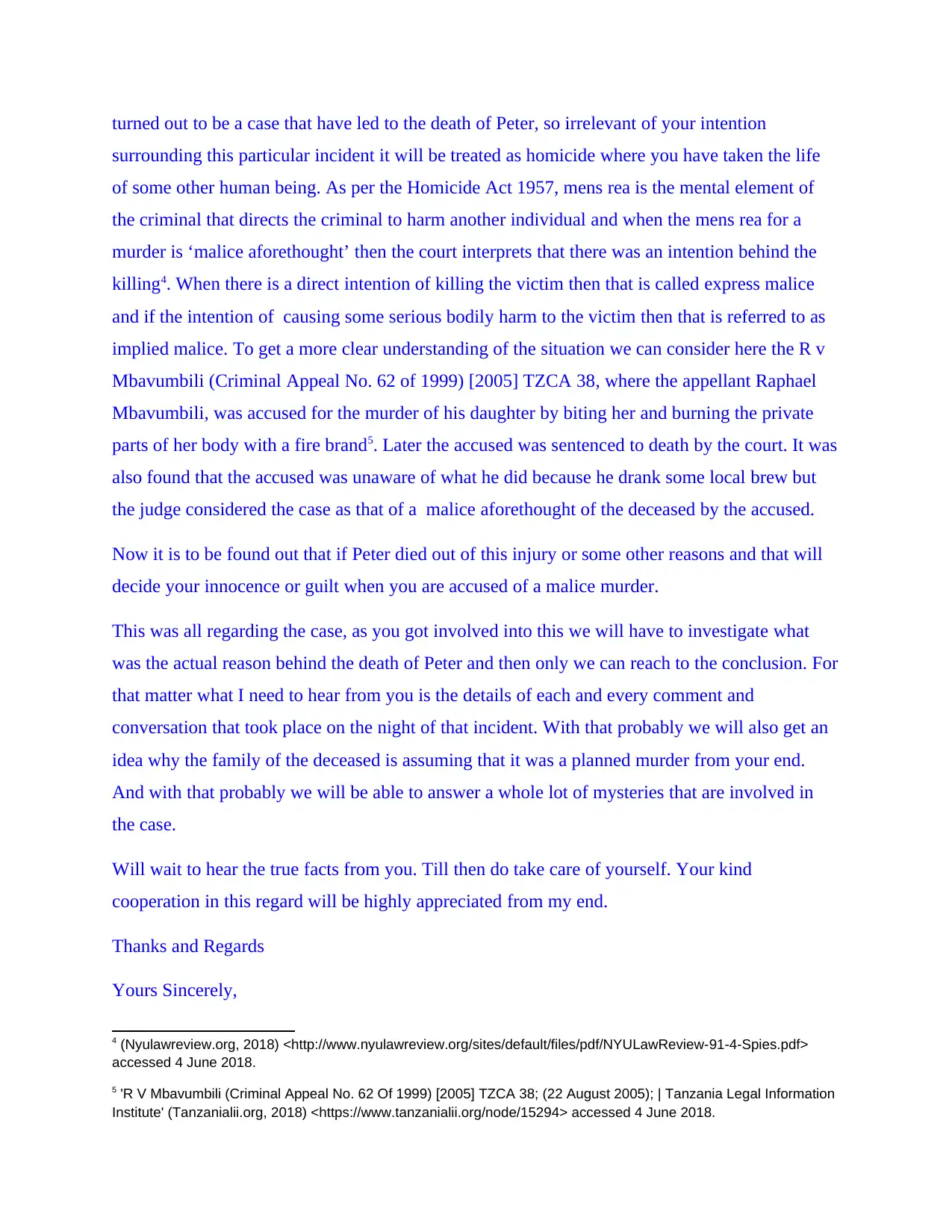
turned out to be a case that have led to the death of Peter, so irrelevant of your intention
surrounding this particular incident it will be treated as homicide where you have taken the life
of some other human being. As per the Homicide Act 1957, mens rea is the mental element of
the criminal that directs the criminal to harm another individual and when the mens rea for a
murder is ‘malice aforethought’ then the court interprets that there was an intention behind the
killing4. When there is a direct intention of killing the victim then that is called express malice
and if the intention of causing some serious bodily harm to the victim then that is referred to as
implied malice. To get a more clear understanding of the situation we can consider here the R v
Mbavumbili (Criminal Appeal No. 62 of 1999) [2005] TZCA 38, where the appellant Raphael
Mbavumbili, was accused for the murder of his daughter by biting her and burning the private
parts of her body with a fire brand5. Later the accused was sentenced to death by the court. It was
also found that the accused was unaware of what he did because he drank some local brew but
the judge considered the case as that of a malice aforethought of the deceased by the accused.
Now it is to be found out that if Peter died out of this injury or some other reasons and that will
decide your innocence or guilt when you are accused of a malice murder.
This was all regarding the case, as you got involved into this we will have to investigate what
was the actual reason behind the death of Peter and then only we can reach to the conclusion. For
that matter what I need to hear from you is the details of each and every comment and
conversation that took place on the night of that incident. With that probably we will also get an
idea why the family of the deceased is assuming that it was a planned murder from your end.
And with that probably we will be able to answer a whole lot of mysteries that are involved in
the case.
Will wait to hear the true facts from you. Till then do take care of yourself. Your kind
cooperation in this regard will be highly appreciated from my end.
Thanks and Regards
Yours Sincerely,
4 (Nyulawreview.org, 2018) <http://www.nyulawreview.org/sites/default/files/pdf/NYULawReview-91-4-Spies.pdf>
accessed 4 June 2018.
5 'R V Mbavumbili (Criminal Appeal No. 62 Of 1999) [2005] TZCA 38; (22 August 2005); | Tanzania Legal Information
Institute' (Tanzanialii.org, 2018) <https://www.tanzanialii.org/node/15294> accessed 4 June 2018.
surrounding this particular incident it will be treated as homicide where you have taken the life
of some other human being. As per the Homicide Act 1957, mens rea is the mental element of
the criminal that directs the criminal to harm another individual and when the mens rea for a
murder is ‘malice aforethought’ then the court interprets that there was an intention behind the
killing4. When there is a direct intention of killing the victim then that is called express malice
and if the intention of causing some serious bodily harm to the victim then that is referred to as
implied malice. To get a more clear understanding of the situation we can consider here the R v
Mbavumbili (Criminal Appeal No. 62 of 1999) [2005] TZCA 38, where the appellant Raphael
Mbavumbili, was accused for the murder of his daughter by biting her and burning the private
parts of her body with a fire brand5. Later the accused was sentenced to death by the court. It was
also found that the accused was unaware of what he did because he drank some local brew but
the judge considered the case as that of a malice aforethought of the deceased by the accused.
Now it is to be found out that if Peter died out of this injury or some other reasons and that will
decide your innocence or guilt when you are accused of a malice murder.
This was all regarding the case, as you got involved into this we will have to investigate what
was the actual reason behind the death of Peter and then only we can reach to the conclusion. For
that matter what I need to hear from you is the details of each and every comment and
conversation that took place on the night of that incident. With that probably we will also get an
idea why the family of the deceased is assuming that it was a planned murder from your end.
And with that probably we will be able to answer a whole lot of mysteries that are involved in
the case.
Will wait to hear the true facts from you. Till then do take care of yourself. Your kind
cooperation in this regard will be highly appreciated from my end.
Thanks and Regards
Yours Sincerely,
4 (Nyulawreview.org, 2018) <http://www.nyulawreview.org/sites/default/files/pdf/NYULawReview-91-4-Spies.pdf>
accessed 4 June 2018.
5 'R V Mbavumbili (Criminal Appeal No. 62 Of 1999) [2005] TZCA 38; (22 August 2005); | Tanzania Legal Information
Institute' (Tanzanialii.org, 2018) <https://www.tanzanialii.org/node/15294> accessed 4 June 2018.
Paraphrase This Document
Need a fresh take? Get an instant paraphrase of this document with our AI Paraphraser
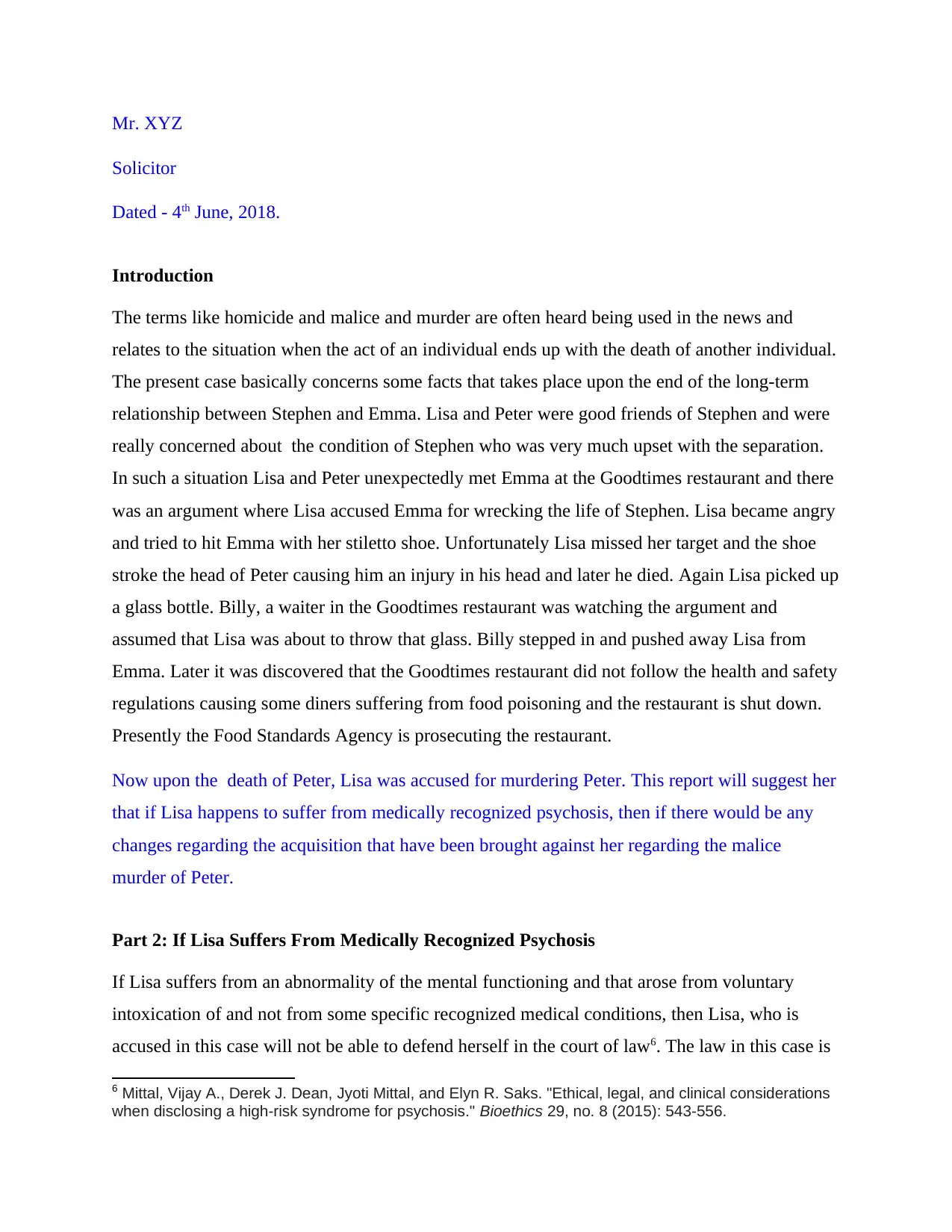
Mr. XYZ
Solicitor
Dated - 4th June, 2018.
Introduction
The terms like homicide and malice and murder are often heard being used in the news and
relates to the situation when the act of an individual ends up with the death of another individual.
The present case basically concerns some facts that takes place upon the end of the long-term
relationship between Stephen and Emma. Lisa and Peter were good friends of Stephen and were
really concerned about the condition of Stephen who was very much upset with the separation.
In such a situation Lisa and Peter unexpectedly met Emma at the Goodtimes restaurant and there
was an argument where Lisa accused Emma for wrecking the life of Stephen. Lisa became angry
and tried to hit Emma with her stiletto shoe. Unfortunately Lisa missed her target and the shoe
stroke the head of Peter causing him an injury in his head and later he died. Again Lisa picked up
a glass bottle. Billy, a waiter in the Goodtimes restaurant was watching the argument and
assumed that Lisa was about to throw that glass. Billy stepped in and pushed away Lisa from
Emma. Later it was discovered that the Goodtimes restaurant did not follow the health and safety
regulations causing some diners suffering from food poisoning and the restaurant is shut down.
Presently the Food Standards Agency is prosecuting the restaurant.
Now upon the death of Peter, Lisa was accused for murdering Peter. This report will suggest her
that if Lisa happens to suffer from medically recognized psychosis, then if there would be any
changes regarding the acquisition that have been brought against her regarding the malice
murder of Peter.
Part 2: If Lisa Suffers From Medically Recognized Psychosis
If Lisa suffers from an abnormality of the mental functioning and that arose from voluntary
intoxication of and not from some specific recognized medical conditions, then Lisa, who is
accused in this case will not be able to defend herself in the court of law6. The law in this case is
6 Mittal, Vijay A., Derek J. Dean, Jyoti Mittal, and Elyn R. Saks. "Ethical, legal, and clinical considerations
when disclosing a high‐risk syndrome for psychosis." Bioethics 29, no. 8 (2015): 543-556.
Solicitor
Dated - 4th June, 2018.
Introduction
The terms like homicide and malice and murder are often heard being used in the news and
relates to the situation when the act of an individual ends up with the death of another individual.
The present case basically concerns some facts that takes place upon the end of the long-term
relationship between Stephen and Emma. Lisa and Peter were good friends of Stephen and were
really concerned about the condition of Stephen who was very much upset with the separation.
In such a situation Lisa and Peter unexpectedly met Emma at the Goodtimes restaurant and there
was an argument where Lisa accused Emma for wrecking the life of Stephen. Lisa became angry
and tried to hit Emma with her stiletto shoe. Unfortunately Lisa missed her target and the shoe
stroke the head of Peter causing him an injury in his head and later he died. Again Lisa picked up
a glass bottle. Billy, a waiter in the Goodtimes restaurant was watching the argument and
assumed that Lisa was about to throw that glass. Billy stepped in and pushed away Lisa from
Emma. Later it was discovered that the Goodtimes restaurant did not follow the health and safety
regulations causing some diners suffering from food poisoning and the restaurant is shut down.
Presently the Food Standards Agency is prosecuting the restaurant.
Now upon the death of Peter, Lisa was accused for murdering Peter. This report will suggest her
that if Lisa happens to suffer from medically recognized psychosis, then if there would be any
changes regarding the acquisition that have been brought against her regarding the malice
murder of Peter.
Part 2: If Lisa Suffers From Medically Recognized Psychosis
If Lisa suffers from an abnormality of the mental functioning and that arose from voluntary
intoxication of and not from some specific recognized medical conditions, then Lisa, who is
accused in this case will not be able to defend herself in the court of law6. The law in this case is
6 Mittal, Vijay A., Derek J. Dean, Jyoti Mittal, and Elyn R. Saks. "Ethical, legal, and clinical considerations
when disclosing a high‐risk syndrome for psychosis." Bioethics 29, no. 8 (2015): 543-556.
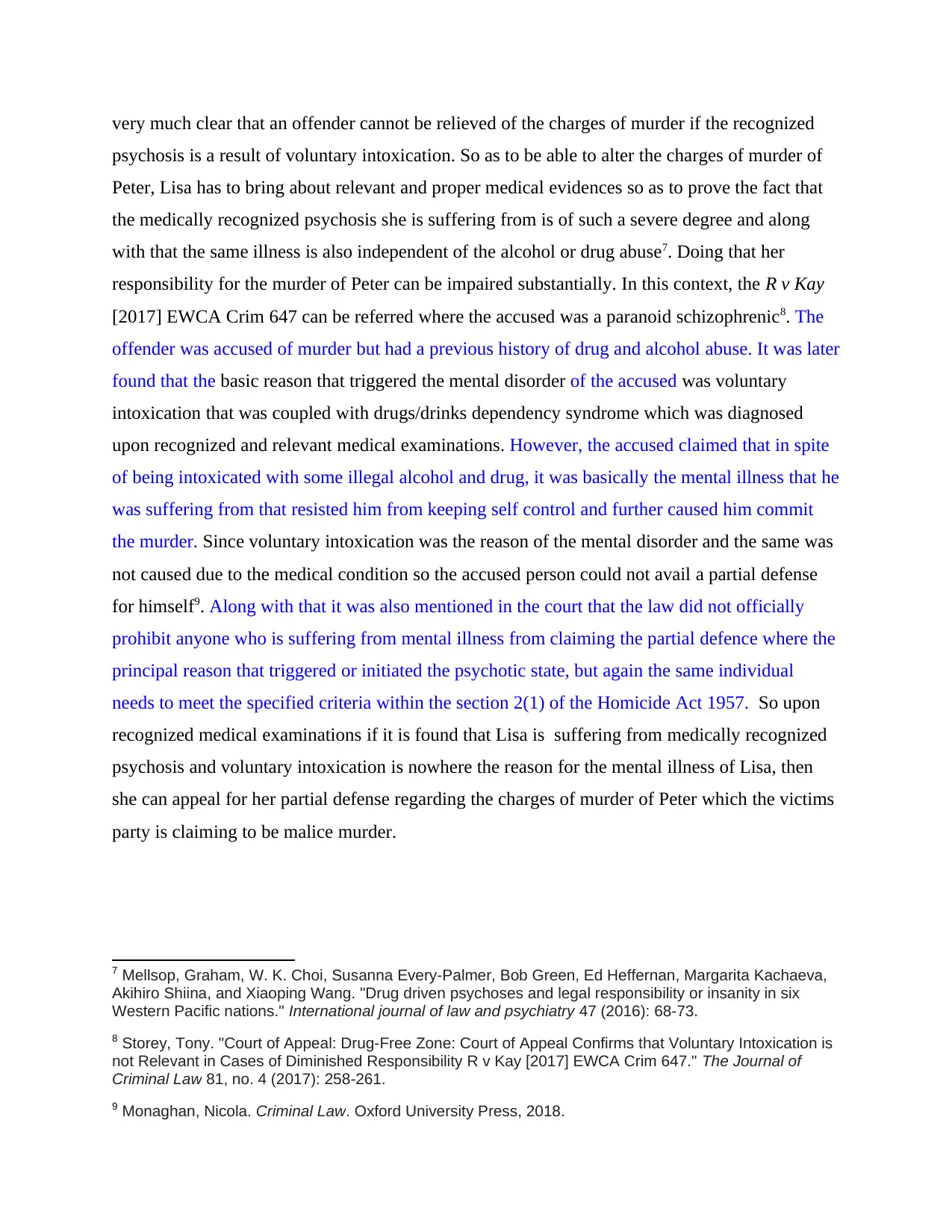
very much clear that an offender cannot be relieved of the charges of murder if the recognized
psychosis is a result of voluntary intoxication. So as to be able to alter the charges of murder of
Peter, Lisa has to bring about relevant and proper medical evidences so as to prove the fact that
the medically recognized psychosis she is suffering from is of such a severe degree and along
with that the same illness is also independent of the alcohol or drug abuse7. Doing that her
responsibility for the murder of Peter can be impaired substantially. In this context, the R v Kay
[2017] EWCA Crim 647 can be referred where the accused was a paranoid schizophrenic8. The
offender was accused of murder but had a previous history of drug and alcohol abuse. It was later
found that the basic reason that triggered the mental disorder of the accused was voluntary
intoxication that was coupled with drugs/drinks dependency syndrome which was diagnosed
upon recognized and relevant medical examinations. However, the accused claimed that in spite
of being intoxicated with some illegal alcohol and drug, it was basically the mental illness that he
was suffering from that resisted him from keeping self control and further caused him commit
the murder. Since voluntary intoxication was the reason of the mental disorder and the same was
not caused due to the medical condition so the accused person could not avail a partial defense
for himself9. Along with that it was also mentioned in the court that the law did not officially
prohibit anyone who is suffering from mental illness from claiming the partial defence where the
principal reason that triggered or initiated the psychotic state, but again the same individual
needs to meet the specified criteria within the section 2(1) of the Homicide Act 1957. So upon
recognized medical examinations if it is found that Lisa is suffering from medically recognized
psychosis and voluntary intoxication is nowhere the reason for the mental illness of Lisa, then
she can appeal for her partial defense regarding the charges of murder of Peter which the victims
party is claiming to be malice murder.
7 Mellsop, Graham, W. K. Choi, Susanna Every-Palmer, Bob Green, Ed Heffernan, Margarita Kachaeva,
Akihiro Shiina, and Xiaoping Wang. "Drug driven psychoses and legal responsibility or insanity in six
Western Pacific nations." International journal of law and psychiatry 47 (2016): 68-73.
8 Storey, Tony. "Court of Appeal: Drug-Free Zone: Court of Appeal Confirms that Voluntary Intoxication is
not Relevant in Cases of Diminished Responsibility R v Kay [2017] EWCA Crim 647." The Journal of
Criminal Law 81, no. 4 (2017): 258-261.
9 Monaghan, Nicola. Criminal Law. Oxford University Press, 2018.
psychosis is a result of voluntary intoxication. So as to be able to alter the charges of murder of
Peter, Lisa has to bring about relevant and proper medical evidences so as to prove the fact that
the medically recognized psychosis she is suffering from is of such a severe degree and along
with that the same illness is also independent of the alcohol or drug abuse7. Doing that her
responsibility for the murder of Peter can be impaired substantially. In this context, the R v Kay
[2017] EWCA Crim 647 can be referred where the accused was a paranoid schizophrenic8. The
offender was accused of murder but had a previous history of drug and alcohol abuse. It was later
found that the basic reason that triggered the mental disorder of the accused was voluntary
intoxication that was coupled with drugs/drinks dependency syndrome which was diagnosed
upon recognized and relevant medical examinations. However, the accused claimed that in spite
of being intoxicated with some illegal alcohol and drug, it was basically the mental illness that he
was suffering from that resisted him from keeping self control and further caused him commit
the murder. Since voluntary intoxication was the reason of the mental disorder and the same was
not caused due to the medical condition so the accused person could not avail a partial defense
for himself9. Along with that it was also mentioned in the court that the law did not officially
prohibit anyone who is suffering from mental illness from claiming the partial defence where the
principal reason that triggered or initiated the psychotic state, but again the same individual
needs to meet the specified criteria within the section 2(1) of the Homicide Act 1957. So upon
recognized medical examinations if it is found that Lisa is suffering from medically recognized
psychosis and voluntary intoxication is nowhere the reason for the mental illness of Lisa, then
she can appeal for her partial defense regarding the charges of murder of Peter which the victims
party is claiming to be malice murder.
7 Mellsop, Graham, W. K. Choi, Susanna Every-Palmer, Bob Green, Ed Heffernan, Margarita Kachaeva,
Akihiro Shiina, and Xiaoping Wang. "Drug driven psychoses and legal responsibility or insanity in six
Western Pacific nations." International journal of law and psychiatry 47 (2016): 68-73.
8 Storey, Tony. "Court of Appeal: Drug-Free Zone: Court of Appeal Confirms that Voluntary Intoxication is
not Relevant in Cases of Diminished Responsibility R v Kay [2017] EWCA Crim 647." The Journal of
Criminal Law 81, no. 4 (2017): 258-261.
9 Monaghan, Nicola. Criminal Law. Oxford University Press, 2018.
⊘ This is a preview!⊘
Do you want full access?
Subscribe today to unlock all pages.

Trusted by 1+ million students worldwide
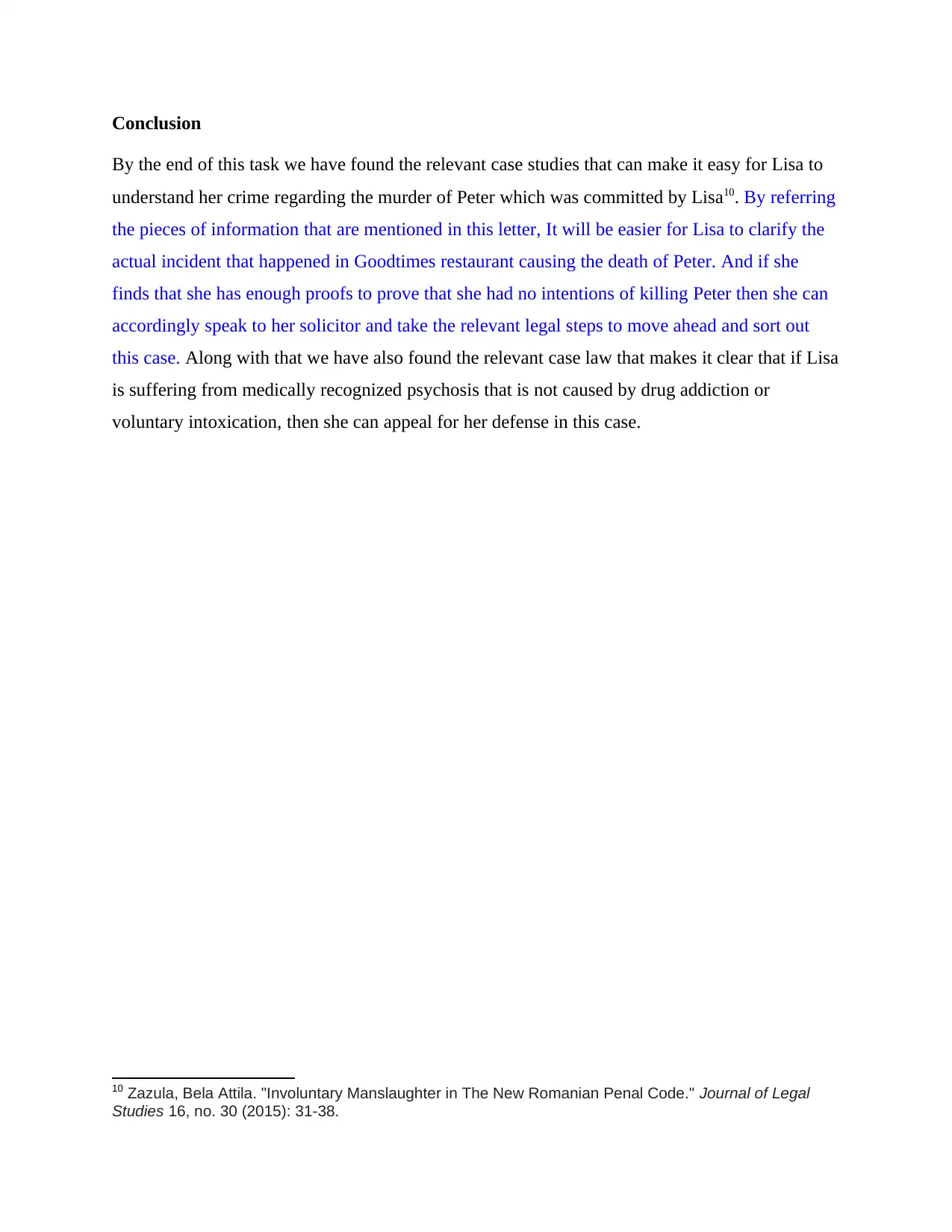
Conclusion
By the end of this task we have found the relevant case studies that can make it easy for Lisa to
understand her crime regarding the murder of Peter which was committed by Lisa10. By referring
the pieces of information that are mentioned in this letter, It will be easier for Lisa to clarify the
actual incident that happened in Goodtimes restaurant causing the death of Peter. And if she
finds that she has enough proofs to prove that she had no intentions of killing Peter then she can
accordingly speak to her solicitor and take the relevant legal steps to move ahead and sort out
this case. Along with that we have also found the relevant case law that makes it clear that if Lisa
is suffering from medically recognized psychosis that is not caused by drug addiction or
voluntary intoxication, then she can appeal for her defense in this case.
10 Zazula, Bela Attila. "Involuntary Manslaughter in The New Romanian Penal Code." Journal of Legal
Studies 16, no. 30 (2015): 31-38.
By the end of this task we have found the relevant case studies that can make it easy for Lisa to
understand her crime regarding the murder of Peter which was committed by Lisa10. By referring
the pieces of information that are mentioned in this letter, It will be easier for Lisa to clarify the
actual incident that happened in Goodtimes restaurant causing the death of Peter. And if she
finds that she has enough proofs to prove that she had no intentions of killing Peter then she can
accordingly speak to her solicitor and take the relevant legal steps to move ahead and sort out
this case. Along with that we have also found the relevant case law that makes it clear that if Lisa
is suffering from medically recognized psychosis that is not caused by drug addiction or
voluntary intoxication, then she can appeal for her defense in this case.
10 Zazula, Bela Attila. "Involuntary Manslaughter in The New Romanian Penal Code." Journal of Legal
Studies 16, no. 30 (2015): 31-38.
Paraphrase This Document
Need a fresh take? Get an instant paraphrase of this document with our AI Paraphraser
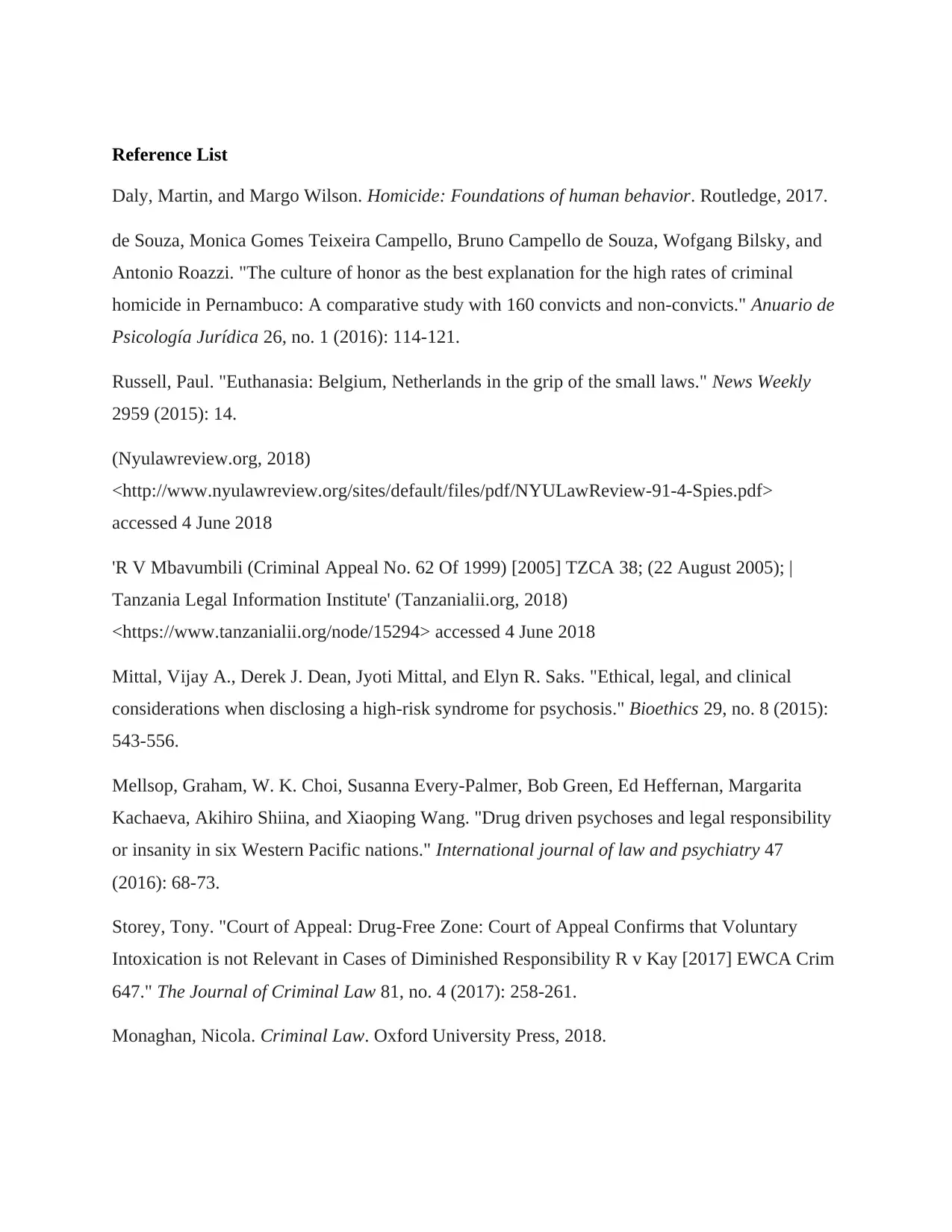
Reference List
Daly, Martin, and Margo Wilson. Homicide: Foundations of human behavior. Routledge, 2017.
de Souza, Monica Gomes Teixeira Campello, Bruno Campello de Souza, Wofgang Bilsky, and
Antonio Roazzi. "The culture of honor as the best explanation for the high rates of criminal
homicide in Pernambuco: A comparative study with 160 convicts and non-convicts." Anuario de
Psicología Jurídica 26, no. 1 (2016): 114-121.
Russell, Paul. "Euthanasia: Belgium, Netherlands in the grip of the small laws." News Weekly
2959 (2015): 14.
(Nyulawreview.org, 2018)
<http://www.nyulawreview.org/sites/default/files/pdf/NYULawReview-91-4-Spies.pdf>
accessed 4 June 2018
'R V Mbavumbili (Criminal Appeal No. 62 Of 1999) [2005] TZCA 38; (22 August 2005); |
Tanzania Legal Information Institute' (Tanzanialii.org, 2018)
<https://www.tanzanialii.org/node/15294> accessed 4 June 2018
Mittal, Vijay A., Derek J. Dean, Jyoti Mittal, and Elyn R. Saks. "Ethical, legal, and clinical
considerations when disclosing a high‐risk syndrome for psychosis." Bioethics 29, no. 8 (2015):
543-556.
Mellsop, Graham, W. K. Choi, Susanna Every-Palmer, Bob Green, Ed Heffernan, Margarita
Kachaeva, Akihiro Shiina, and Xiaoping Wang. "Drug driven psychoses and legal responsibility
or insanity in six Western Pacific nations." International journal of law and psychiatry 47
(2016): 68-73.
Storey, Tony. "Court of Appeal: Drug-Free Zone: Court of Appeal Confirms that Voluntary
Intoxication is not Relevant in Cases of Diminished Responsibility R v Kay [2017] EWCA Crim
647." The Journal of Criminal Law 81, no. 4 (2017): 258-261.
Monaghan, Nicola. Criminal Law. Oxford University Press, 2018.
Daly, Martin, and Margo Wilson. Homicide: Foundations of human behavior. Routledge, 2017.
de Souza, Monica Gomes Teixeira Campello, Bruno Campello de Souza, Wofgang Bilsky, and
Antonio Roazzi. "The culture of honor as the best explanation for the high rates of criminal
homicide in Pernambuco: A comparative study with 160 convicts and non-convicts." Anuario de
Psicología Jurídica 26, no. 1 (2016): 114-121.
Russell, Paul. "Euthanasia: Belgium, Netherlands in the grip of the small laws." News Weekly
2959 (2015): 14.
(Nyulawreview.org, 2018)
<http://www.nyulawreview.org/sites/default/files/pdf/NYULawReview-91-4-Spies.pdf>
accessed 4 June 2018
'R V Mbavumbili (Criminal Appeal No. 62 Of 1999) [2005] TZCA 38; (22 August 2005); |
Tanzania Legal Information Institute' (Tanzanialii.org, 2018)
<https://www.tanzanialii.org/node/15294> accessed 4 June 2018
Mittal, Vijay A., Derek J. Dean, Jyoti Mittal, and Elyn R. Saks. "Ethical, legal, and clinical
considerations when disclosing a high‐risk syndrome for psychosis." Bioethics 29, no. 8 (2015):
543-556.
Mellsop, Graham, W. K. Choi, Susanna Every-Palmer, Bob Green, Ed Heffernan, Margarita
Kachaeva, Akihiro Shiina, and Xiaoping Wang. "Drug driven psychoses and legal responsibility
or insanity in six Western Pacific nations." International journal of law and psychiatry 47
(2016): 68-73.
Storey, Tony. "Court of Appeal: Drug-Free Zone: Court of Appeal Confirms that Voluntary
Intoxication is not Relevant in Cases of Diminished Responsibility R v Kay [2017] EWCA Crim
647." The Journal of Criminal Law 81, no. 4 (2017): 258-261.
Monaghan, Nicola. Criminal Law. Oxford University Press, 2018.

Zazula, Bela Attila. "Involuntary Manslaughter in The New Romanian Penal Code." Journal of
Legal Studies 16, no. 30 (2015): 31-38.
Legal Studies 16, no. 30 (2015): 31-38.
⊘ This is a preview!⊘
Do you want full access?
Subscribe today to unlock all pages.

Trusted by 1+ million students worldwide
1 out of 9
Related Documents
Your All-in-One AI-Powered Toolkit for Academic Success.
+13062052269
info@desklib.com
Available 24*7 on WhatsApp / Email
![[object Object]](/_next/static/media/star-bottom.7253800d.svg)
Unlock your academic potential
Copyright © 2020–2026 A2Z Services. All Rights Reserved. Developed and managed by ZUCOL.





